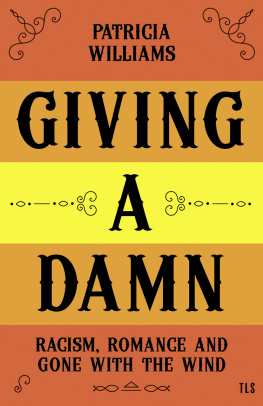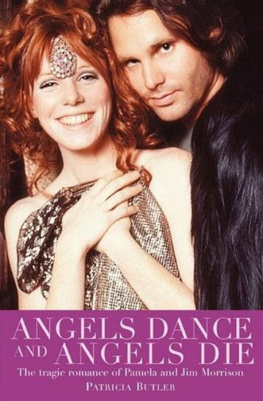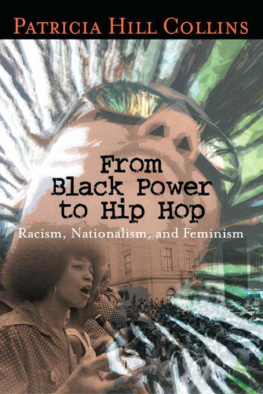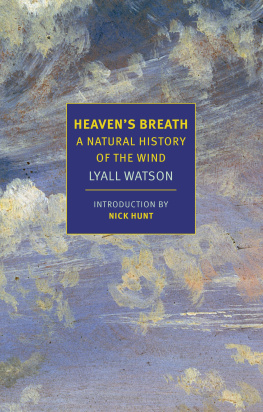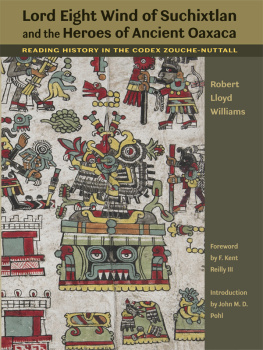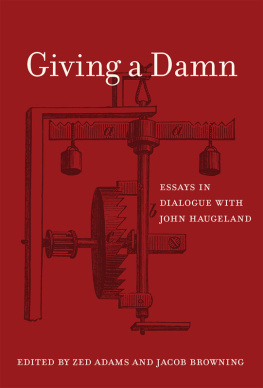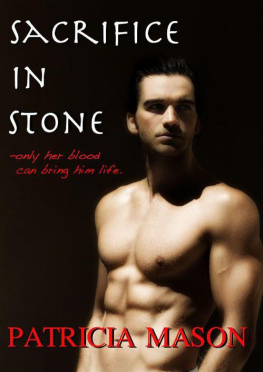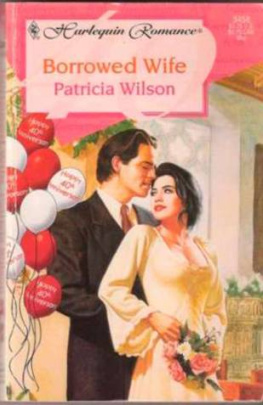Patricia Williams - Giving a Damn: Racism, Romance and Gone with the Wind
Here you can read online Patricia Williams - Giving a Damn: Racism, Romance and Gone with the Wind full text of the book (entire story) in english for free. Download pdf and epub, get meaning, cover and reviews about this ebook. year: 2021, publisher: HarperCollins Publishers, genre: Art. Description of the work, (preface) as well as reviews are available. Best literature library LitArk.com created for fans of good reading and offers a wide selection of genres:
Romance novel
Science fiction
Adventure
Detective
Science
History
Home and family
Prose
Art
Politics
Computer
Non-fiction
Religion
Business
Children
Humor
Choose a favorite category and find really read worthwhile books. Enjoy immersion in the world of imagination, feel the emotions of the characters or learn something new for yourself, make an fascinating discovery.
- Book:Giving a Damn: Racism, Romance and Gone with the Wind
- Author:
- Publisher:HarperCollins Publishers
- Genre:
- Year:2021
- Rating:3 / 5
- Favourites:Add to favourites
- Your mark:
- 60
- 1
- 2
- 3
- 4
- 5
Giving a Damn: Racism, Romance and Gone with the Wind: summary, description and annotation
We offer to read an annotation, description, summary or preface (depends on what the author of the book "Giving a Damn: Racism, Romance and Gone with the Wind" wrote himself). If you haven't found the necessary information about the book — write in the comments, we will try to find it.
Giving a Damn: Racism, Romance and Gone with the Wind — read online for free the complete book (whole text) full work
Below is the text of the book, divided by pages. System saving the place of the last page read, allows you to conveniently read the book "Giving a Damn: Racism, Romance and Gone with the Wind" online for free, without having to search again every time where you left off. Put a bookmark, and you can go to the page where you finished reading at any time.
Font size:
Interval:
Bookmark:

The Times Literary Supplement was born in January 1902. Its first ever front page bashfully stated that during the Parliamentary session Literary Supplements to The Times will appear as often as may be necessary in order to keep abreast with the more important publications of the day. Fortunately, the question of necessity was not left in the hands of literary journalists (who, we can imagine, might occasionally push for a holiday or two), and the title became a weekly one. A few years later, the TLS split entirely from The Times.
Since then, we have prided ourselves on being the worlds leading magazine for culture and ideas. Our guiding principle for the selection of pieces remains the same as it ever has been: is it interesting; and is it beautifully written? Over the years, our contributors have included the very best writers and thinkers in the world: from Virginia Woolf to Seamus Heaney, Sylvia Plath to Susan Sontag, Milan Kundera to Christopher Hitchens, Patricia Highsmith to Martin Scorsese.
The book you are holding is part of a brand-new imprint, TLS Books, by which we are striving to bring more beautiful writing to a wider public. We hope you enjoy it. If you want to read more from us, youll find a special trial subscription offer to the TLS at the back of this book.
In an ever-quickening culture of flipness and facility, fake news and Facebook, the TLS is determined to be part of the counter-culture of quality. We believe in expertise, breadth and depth. We believe in the importance of ideas, and the transformative power of art. And we believe that, in reading the TLS in whatever form, be it in a magazine, online or in a book you are supporting a set of values that we have been proud to uphold for more than a hundred years. So thank you for that.
Stig Abell, Editor-in-Chief, TLS Books
London, 2021
TLS Books
An imprint of HarperCollinsPublishers
1 London Bridge Street
London SE1 9GF
The-TLS.co.uk
HarperCollinsPublishers
1st Floor, Watermarque Building, Ringsend Road,
Dublin 4, Ireland
This eBook published in Great Britain by TLS Books in 2021
Copyright Patricia J. Williams 2021
Patricia J. Williams asserts the moral right to be identified as the author of this work in accordance with the Copyright, Designs and Patents Act 1988
Home by Warsan Shire, copyright 2014. Reprinted by permission of the author
Cover design by Luke Bird
A catalogue record for this book is available from the British Library
All rights reserved under International and Pan-American Copyright Conventions. By payment of the required fees, you have been granted the non-exclusive, non-transferable right to access and read the text of this e-book on-screen. No part of this text may be reproduced, transmitted, down-loaded, decompiled, reverse engineered, or stored in or introduced into any information storage and retrieval system, in any form or by any means, whether electronic or mechanical, now known or hereinafter invented, without the express written permission of HarperCollins.
Source ISBN: 9780008404505
Ebook Edition April 2021 ISBN: 9780008404512
Version: 2021-04-13
Here was the last ever to be seen of the Knights and their ladies Fair, of Master and of Slave [] it is no more than a dream remembered.
It was not a kind thought that flitted across my mind while I waited at the airport in Montreal. The weather was bad, my flight was late and I was having lunch on the American side of the terminal, listening to a big, jovial man talking about his sons wedding on a former cotton plantation in Charleston, South Carolina. The man was discussing ordinary things the weather, the bride, the wine served, what music they played. Everyone, he said, was dressed in antebellum clothing: So much fun! is how he summed it up.
Dancing on graves! is what went through my mind. And then, quick on its heels, a well-disciplined self-flagellation, a socialized apologia: Am I being uncharitable?
The man and his companion passed on to the vast quantities of beer consumed at the reception. How rowdy, but yknow happy-rowdy the grooms fraternity brothers grew as the night progressed and how certain he was that nobody slept that night, heh-heh-heh.
The second unkind thought that passed through my mind was: I am so glad that neither this man nor his son nor his sons beer-guzzling frat-bros own my body.
I suppose a bit of explanation is in order here: The overwhelming majority of African Americans are to some degree the carnal issue of precisely that heh-heh-heh. I, for example, am only the third generation of my family whose body is not legally owned by others. My maternal great-grandmother was born a slave. My maternal great-grandfather was a white slaveholder who impregnated her sometime around 1860 in order to increase his livestock of plantation labourers, his stock of lives. It was not just sport to rape ones slaves: the children therefrom were valuable currency, investments in their owners wealth by virtue of their potential for profitable divestment.
The poet Caroline Randall Williams is the great-great-granddaughter of Edmund Pettus, the storied Confederate general, the grand dragon of the Ku Klux Klan, the man for whom Selmas Bloody Sunday Bridge is named, as she put it in an op-ed succinctly entitled: You Want a Confederate Monument? My Body is a Confederate Monument in The New York Times on June 26, 2020. Writing about the removal of Confederate monuments, she observed that there are those who dismiss the hardships of the past. They imagine a world of benevolent masters, and speak with misty eyes of gentility and honor and land. They deny plantation rape, or explain it away, or question the degree of frequency with which it occurred. To those people it is my privilege to say, I am proof.
Americas history is one in which Black and white families are traumatically interconnected. But that history is repressed. The pain of it echoes across generations. Nearly all Black Americans are the thoroughly mixed progeny of white slaveholders, the violence of whose paternity is variously misperceived as a biological stain, an unfortunate mutation, a legal non-fiction, a dark political taboo.
The scars of slaverys violence are hard to talk about. My mind drags the details into the present involuntarily, for, like any taboo, these feelings are deep in my autonomic system, as persistent reiteration, as terrible hallucination. A thing which has lost its idea is like the man who has lost his shadow, and it must either fall under the sway of madness or perish, wrote Jean Baudrillard.
Growing up, I was protected, insulated, cautioned and by some measures made paranoid by my grandmothers narrative: They the always-watchful they! might own your body, but they can never own you. That was her sound advice, a coming to terms in the present with a very complicated past. I am safest, I learned at a very young age, when I can discipline myself to leave the body behind. It is a mystery, a kind of magic, to be raised both within and without oneself; to see and to see oneself seeing. That is the stress that W. E. B. Du Bois called double consciousness, this sense of always looking at ones self through the eyes of others, of measuring ones soul by the tape of a world that looks on in amused contempt and pity. One feels his two-ness, an American, a Negro; two souls, two thoughts, two unreconciled strivings; two warring ideals in one dark body, whose dogged strength alone keeps it from being torn asunder. It is also a kind of madness to dissociate from ones deepest organs of knowing; to cut the cord to the lifeboat of the present, and trust that past and future will form the raft upon which you might purchase your own survival.
Font size:
Interval:
Bookmark:
Similar books «Giving a Damn: Racism, Romance and Gone with the Wind»
Look at similar books to Giving a Damn: Racism, Romance and Gone with the Wind. We have selected literature similar in name and meaning in the hope of providing readers with more options to find new, interesting, not yet read works.
Discussion, reviews of the book Giving a Damn: Racism, Romance and Gone with the Wind and just readers' own opinions. Leave your comments, write what you think about the work, its meaning or the main characters. Specify what exactly you liked and what you didn't like, and why you think so.

